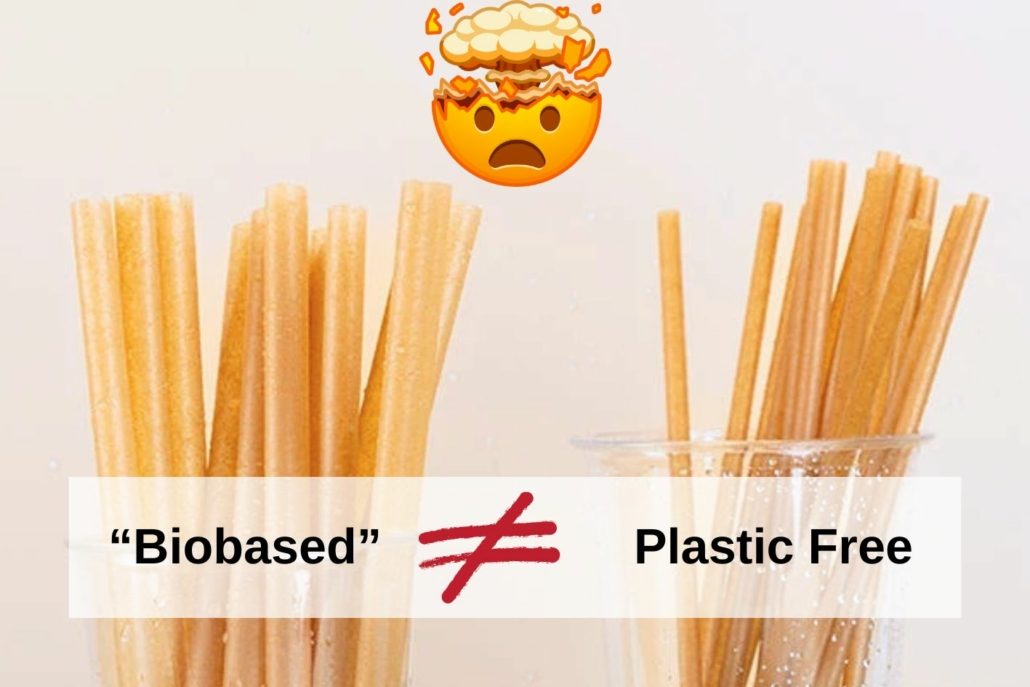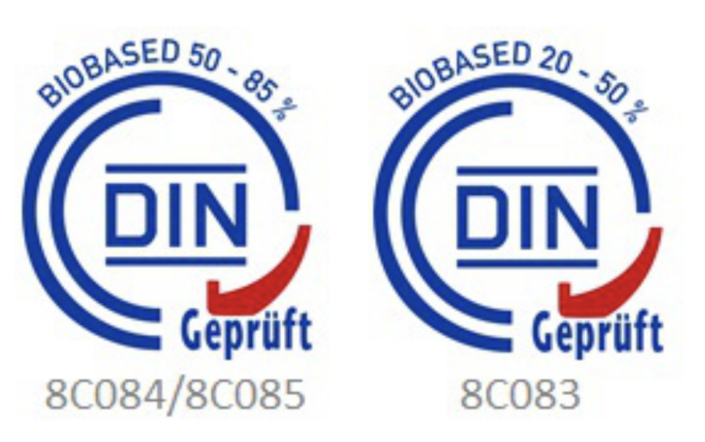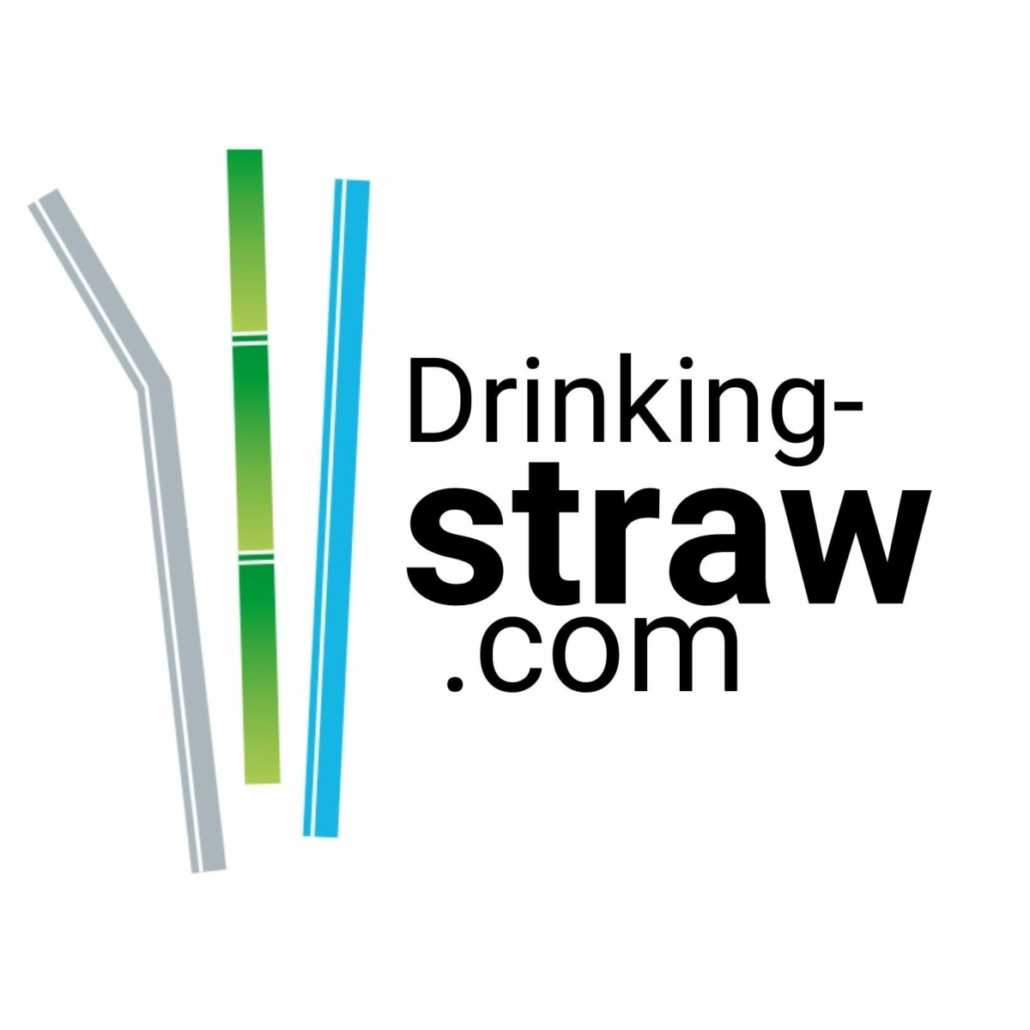What is Biosourced and Bioplastic straw ? Prohibitions and Explanations.

For over a year, both in France and across the European Union, there has been a significant proliferation of plastic straws labeled as “organic”, “biosourced”, “plant fiber”, “biopolymer”, “plastic-free guarantee”, or “home compostable”.
We seek to provide clarification regarding these ambiguous terms, which sometimes avoid the use of the term “plastic”, despite encompassing various plastic materials. Many products have been marketed as being made from corn starch when they are actually composed of PLA, a biosourced plastic. Additionally, there are numerous other biosourced plastics derived from renewable materials such as fibers, hemp, sugar cane, wood/micronized fibers, avocado pits, etc.
While bio-based plastic products, including straws, are permitted in some parts of the world, the European Union rules on single-use plastic products (SUPD), which has been enforced in the European Union since 2021, explicitly prohibits the use of single-use straws made entirely or partially of plastic, regardless of their labeling as “bio-sourced” or “home compostable”. The use of such straws by professionals is not authorized and may result in sanctions imposed by the French control DGCCRF (Directorate General for Competition, Consumption, and Fraud Repression).
The purpose of this article is to clarify these terms and their implications, empowering catering and hospitality professionals to make well-informed decisions.
Definition of a biosourced, bioplastic, biopolymer straw
There is still too much misinformation about bioplastics, particularly regarding the term “bio”, which does not necessarily mean that the product complies with regulations or is environmentally sustainable.
A biobased straw may contain plastic; although it is not 100% fossil-based plastic, it may contain partially or entirely biobased plastic. However, the law considers both cases as plastic. Yet, what is the difference?
The terms “biobased”, “plant fibers”, or “biopolymers” refer to the materials used to manufacture the straw, sourced from renewable and organic resources such as corn/wheat, sugarcane, avocado pits, bamboo/wood fibers, or even marine materials (algae). However, this does not necessarily guarantee the absence of plastic, as the biobased material may only be partial.
Our team has received dozens of flexible straws marketed as ‘plastic-free’. However, over the course of 5 years, it is evident that all of them unfortunately contained a binder of fossil-based and/or biobased plastic.”
Therefore, we believe it is important to request verification/certification, such as by asking for the DIN-Geprüft Biobased certification, which can specify the true content of biobased carbon in production. As you may have understood, Biobased (biobased) = “bio”plastic, as a product labeled as biobased may contain fossil resources (petroleum).
This analysis provides, for example, the result below for a PBS material. For instance, these two logos indicate that the BioPBS material contains only a portion of biobased material (50 to 85% or 20 to 50%).

Source: Bio PBS biosourced plastic sheet
Many consumers believe that all biobased or biopolymer straws are made from plants (corn starch, cassava flour, coffee grounds, wood fibers/liquid or micronized wood, avocado pits, sugarcane bagasse…) that can completely decompose in the environment (domestic compost, marine) and would be better than fossil-based plastics. But that’s not the case.
Indeed, biobased products are not necessarily 100% natural or biodegradable. They may include materials from biomass while using chemical techniques or be treated with chemical additives and pollutants. If your straw does not resemble a natural product (such as wheat stem, reed, or bamboo stem, for example), it is highly likely that your straw has undergone a chemical transformation to mix it with other materials. This modification can be done with chemical binders and plastics to allow the mixing of materials and the creation of the final product. Moreover, “biobased” or “plant fiber” straws can be mixed with biobased plastics (biopolyesters, thermoplastics, biopolymers, etc.) such as PBS (polybutylene succinate), PHA (poly-hydroxy acids), PLA, PHB… Here is, for example, a non-exhaustive list of plastics identified by the French government:
To avoid confusion, we strongly recommend paying close attention to the texture of your straws (flexible or colored brown/beige) and insisting that your straw suppliers provide compliance documents such as European laboratory tests to verify the absence of plastic materials such as PBS, PHA, PHB, etc. If you cannot obtain these documents, you may conduct a pyrolysis test through a laboratory to identify the components.
We also advise exercising caution with products marketed as “plastic-free” accompanied by an asterisk (*) to cite only a few examples of materials excluding the plastic used in the product.
Why are disposable biobased straws banned?
Why are disposable straws labeled as “biobased”, “biopolymer”, “plant fibers”, or “home compostable” banned and could potentially have harmful effects on the environment and humans?
- Disposable biobased and compostable straws are banned by law: since 2021, the SUPD law prohibits disposable straws made of plastic, even if biobased. Indeed, “The exemption granted to compostable products in home composting and consisting, wholly or partly, of biobased materials, mentioned in the same paragraph, is no longer applicable from July 3, 2021.“ Disinfection of items in industrial dishwashers is achieved through water heated to high temperature (85°C) during the rinsing process,” according to nordiskclean.
- Biobased products may not degrade in home compost and may release pollutants: according to the French Agency for Food, Environmental and Occupational Health & Safety (ANSES) in an opinion published in October 2022. Plastics claiming to be “biobased, biodegradable, or compostable” may not completely degrade in home composters and, worse, release substances such as polymers, residual monomers, additives, or inorganic fillers, thus contributing to environmental pollution.
- Biobased products may be harmful to the environment and humans: a team of researchers from Frankfurt, Germany, studied 43 different bioplastics (or biobased plastics) (including PBS, PHA, PHB, PLA…) and found that many of them contained the same chemicals as petroleum-based plastics. Some of these chemicals are endocrine disruptors. “Our results indicate that the majority (67%) of bioplastics and plant-based products contain toxic chemicals as well as a large number and diversity of compounds (> 1,000 chemical features each in 80% of the samples).” Even if some biobased products are certified home compostable, this does not guarantee easy degradation, as in certain oceanic regions, for example, degradation is so slow that the product may not disappear without impacting the environment.
- Biobased plastics may contain several chemicals: some of which could potentially have harmful effects on humans and other organisms if released into the environment. This same study suggests that the chemical mixtures present in biodegradable plastics can influence the metabolic activity of certain living organisms. Christoph Lauwigi highlights in the German Plastic Atlas that the expansion of bioplastics could exert additional pressure on arable land, leading to risks of water shortages, desertification, habitat loss, and biodiversity loss. He also emphasizes the potential negative impact of industrial agriculture associated with the production of these new plastics on monocultures and the use of pesticides.
“What are the natural alternatives to biobased plastic straws?”
There are natural alternatives without any biobased plastic, which are more durable and environmentally friendly. Here are some examples of disposable natural straws or long-lasting reusable straws commonly used by hospitality professionals:
- Disposable Paper Straws: They are disposable and plastic-free. It’s important to prioritize paper straws certified by FSC and free from PFAS (Yes, it’s possible)!
- Natural Stem Straws: There are straws made from wheat, rye, reed, bamboo, or lepironia stems, offering an option made without any transformation and naturally compostable at home.
- Edible Disposable Straws: Made from wheat, corn, or rice flour, they are edible and safe (it’s important to check your supplier’s IFS food certification). These options offer a variety of colors (black, white, blue…).
- Wood Slice Straws: The Forest straw is a trendy new innovation made from durable wood slices for both cold and hot drinks. Certified by FSC, the forest straw is a disposable, sustainable, and eco-friendly solution.
- Reusable Stainless Steel Straws: They are durable, reusable for years, and do not pose the environmental problems associated with plastics. They are made from certified 304 stainless steel, which is infinitely recyclable.
- Reusable Glass Straws: They are transparent, elegant, and reusable for years as well. They are easy to clean and provide a plastic-free alternative with recyclable material.
_____
In summary, it is essential to consider informed consumption. A call is made for transparent regulation to avoid greenwashing and to encourage sustainable practices in the “bioplastic” industry. Ultimately, this article aims to raise awareness among consumers about the nuances surrounding biobased/organic/plant-based straws and to encourage thoughtful consideration of engaged and responsible consumption choices.
Finally, we recommend consulting the report compiled by the associations Zero Waste France, France Nature Environnement, No Plastic In My Sea, Les Amis de la Terre France, and Surfrider Foundation Europe, which provide their assessment of the implementation of the AGEC law (SUPD law) and their recommendations. Regarding straws, this report indicates in particular:
“Furthermore, bioplastic straws marketed as ‘reusable’ also constitute a circumvention of the law. Indeed, composed of plastics derived from the fermentation of crops or extracts from bacterial fermentation (PLA, PHA, PBS), these straws are sold as more ecological alternatives with mentions of being ‘biobased’ or ‘biopolymers’ or even ‘plastic-free guarantee’, when they are technically not reusable multiple times, as they do not meet the washing resistance criteria (DIN 10534 standard) and integration into a reuse system.”
Note: DRINKING-STRAW.COM is not a legal service or lawyer. For any information on applicable regulations concerning plastic straws, we recommend consulting a legal specialist.


Leave a Reply
Want to join the discussion?Feel free to contribute!